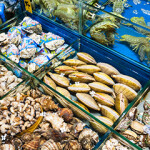Seafood industry cuts ties to Chinese firms accused of using Uyghur labor

Global seafood companies and retailers are reacting to a recent report by the Outlaw Ocean Project detailing the use of state-sponsored forced labor, as defined by the U.S. Uyghur Forced Labor Protection Act of 2021, by some Chinese processing firms.
The report, published in The New Yorker magazine on 9 October, led Albertsons Companies to drop flounder and yellowtail sole products from High Liner Foods in early September – before the news was published. High Liner in turn said it also it has ended its business with Yantai Sanko Fisheries in light of the reporting.
Albertsons and High Liner are just two of the 277 different companies involved in fishing, processing, importing, exporting, retailing, or other activities pertaining to the Chinese companies implicated in using Uyghur labor, which include Chishan Group, Yantai Sanko Fisheries, Yantai Longwin Foods, Rongcheng Haibo, Rongchen Xinhui Aquatic Products, Qingdao Tianyuan Aquatic Foodstuffs, the Rongsense Group, Shandong Meijia, and Shandong Haidu.
As detailed by the Outlaw Ocean Project, corporate responses to the allegations have varied from a lack of response to an immediate ending of business dealings with the suppliers in question.
Nissui-subsidiary Cité Marine, which supplies seafood to Sysco France, was implicated in the report as sourcing Alaskan pollock from a company called Qingdao Tianyuan Aquatic Products. According to the report, the company “received persons from the Xinjiang region of China under a state-imposed labor transfer program.” The Outlaw Ocean Project also said that Qingdao Lian Yang Aquatic Products was also linked to Qingdao Tianyuan.
In response to the implications, Cité Marine said that it does not work with Qingdao Lian Yang, and that Qingdao Tianyuan Aquatic Product company is certified to the Marine Stewardship Council’s chain of custody standard, which includes labor standards.
“This standard guarantees compliance with social standards, including the absence of forced labor,” Cité Marine Assistant General Manager Sylbie Gey told investigators.
Gey said Cité Marine immediately commissioned an unannounced SMETA audit, which did not find any Uyghur labor at the Qingdao Tianyuan Aquatic Product plant. However, the company said it has ceased being supplied by the factor “as a precaution.”
Nichirei was also contacted by the Outlaw Ocean Project, questioning its involvement with Dandong Yuanyi, which was accused of using North Korean labor after a December 2019 deadline for the repatriation of North Korean workers under a United Nations Security Council Resolution. The company after asked for more information regarding the investigations, then reviewed its relationship with the company, declaring that self-assessments and third-party audits had both shown complete compliance with its policies.
“When we were informed of the allegations, we took immediate action, including proactively launching an on-site supplier audit and notifying our distributors and the relevant U.S. agencies,” Nichirei said. “Although we have not found any evidence in our ongoing investigation to corroborate the allegations, we have halted deliveries and canceled future orders from the supplier in the U.S., and we will continue to review information and take action as appropriate.”
Dozens of retailers that had sourced seafood from High Liner Foods, including Sobeys, the owner of IGA, as well as Walmart Canada, said they were investigating the allegations. Kroger, Aldi U.S., and Dollar General didn’t respond to questions regarding their sourcing.
Nomad Foods, Lund’s Seafood, and Young’s Seafood were also named in the report as having sourced seafood from Chinese processing firms that had allegedly used Uyghur labor. Ahold Delhaize, which owns and operates Food Lion, Giant Food, and Hannaford, and Aldi said that they had launched investigations into the allegations. Many retailers said if more evidence came to light the companies would drop suppliers.
“If necessary, appropriate consequences will be applied, which may range from joint development of action plans to termination of cooperation,” a public relations specialist for Aldi South, Cathleen Volkel, told the Outlaw Ocean Project.
Most of the initial internal investigations by both the Chinese processors themselves and their U.S. and international clients turned up no evidence of Uyghur labor being employed, according to their responses, but that could be because its use in China is not illegal and third-party social audits are not reliable, according to Scott Nova, the executive director of the Worker Rights Consortium, a nongovernmental organization monitoring labor rights globally. Nova told The New Yorker social audits are typically announced ahead of time, allowing managers to hide workers they don’t want detected. And workers who are interviewed may be afraid of reprisals if they are candid.
Cornell University Professor of Industrial Relations Sarosh Kuruvilla questioned the value of social audits after analyzing more than 40,000 completed globally and finding almost half to be unreliable.
“The tool is completely broken,” he said. “It’s a tick-box exercise on the part of the auditor, but it’s also a tick-box exercise on the part of the brand.”
The author of the report, independent journalist Ian Urbina, who worked at The New York Times for 20 years, spending many of those uncovering abuses in the global seafood industry, said he ...
Image courtesy of U.S. Department of Labor





Share